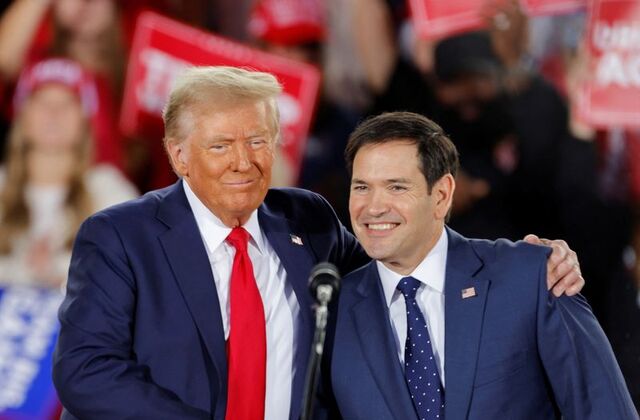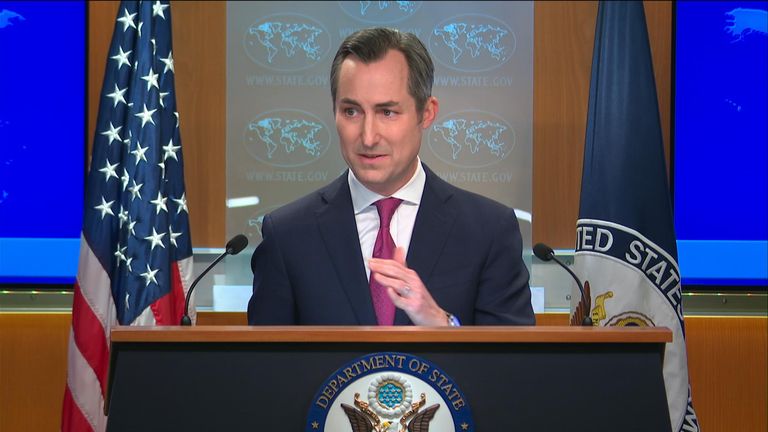PTBP Web Desk
Donald Trump is expected to nominate U.S. Senator Marco Rubio as his Secretary of State once he officially assumes office as president in January.
This decision would mark a historic moment for U.S. politics, as Rubio, a Florida-born Republican, would become the first Latino to serve as America’s top diplomat. Sources close to the matter confirmed on Monday that the president-elect had seemingly settled on Rubio for the high-profile position.
This potential appointment signals a significant moment in the evolution of U.S. foreign policy under Trump, reflecting a shift towards more restrained diplomacy that has defined much of Trump’s political ideology. While Rubio, 53, was once known for his hawkish stance on global affairs, his views have evolved over time, aligning more closely with the president-elect’s approach to international relations.
Marco Rubio has long been a staunch advocate for a robust and assertive U.S. foreign policy. He has been vocal about confronting America’s geopolitical adversaries, including China, Iran, and Cuba. However, over the past several years, Rubio has softened some of his positions and increasingly adopted Trump’s more cautious stance on international conflicts.
In particular, Trump has been critical of U.S. involvement in long-standing overseas conflicts, accusing past presidents of leading America into costly wars with little strategic gain. Trump has emphasized the need for a foreign policy focused on national interests and restrained military intervention.
Rubio, who initially supported a more interventionist approach, now finds himself in agreement with Trump’s vision of a foreign policy that seeks to avoid entanglements in distant conflicts. This is evident in his position on the ongoing war in Ukraine, where he has called for a negotiated settlement with Russia rather than an all-out military victory for Ukraine. Rubio’s more pragmatic approach to international relations reflects a broader shift within the Republican Party, which has increasingly leaned towards a foreign policy that emphasizes diplomacy over military action.
Rubio’s stance on the war in Ukraine is expected to be a key issue on his agenda if he is confirmed as Secretary of State. The conflict, which has continued to escalate since Russia’s annexation of Crimea in 2014, has seen widespread international condemnation, particularly from Western nations. However, Rubio has argued that Ukraine should seek a negotiated settlement with Russia, acknowledging that the war may not end with Ukraine regaining all of its lost territory.
In a September interview, Rubio told NBC, “I’m not on Russia’s side — but unfortunately, the reality of it is that the way the war in Ukraine is going to end is with a negotiated settlement.” His position aligns with Trump’s desire to avoid a military confrontation with Russia and suggests that Rubio’s approach to diplomacy would reflect the president-elect’s preference for restraint in foreign affairs.
In contrast to more traditional Republican hawks, Rubio’s position indicates a broader shift in Republican foreign policy under Trump. Once a party known for advocating military intervention and aggressive foreign policies, the Republican Party has increasingly embraced a more restrained approach, particularly when it comes to Europe. Many Republican lawmakers now criticize U.S. allies for not contributing enough to defense spending, and Rubio’s stance appears to be a reflection of this growing sentiment.
Marco Rubio’s nomination as Secretary of State carries significant domestic implications as well. In the recent presidential election, Trump won over a large portion of the Latino vote, a demographic that has traditionally leaned Democratic in previous election cycles. By appointing Rubio, who is of Cuban descent, to such a prominent role, Trump would underscore his commitment to Latinos and demonstrate their increasing influence within his administration.
Rubio’s selection could help Trump solidify his gains among Latino voters and send a clear message that Latinos have a place at the highest levels of government. According to Mauricio Claver-Carone, a close ally of Rubio and former president of the Inter-American Development Bank, Rubio’s appointment would also signal a greater focus on Latin America within U.S. foreign policy. “This is the time Latin America will most be on the map in the history of any U.S. presidency,” Claver-Carone said, calling Rubio’s potential appointment “historic.”
If confirmed, Rubio would likely place more emphasis on Latin America than any previous U.S. Secretary of State. Rubio has long been an advocate for policies that prioritize U.S. interests in the region, particularly regarding trade, immigration, and national security. With his deep understanding of Latin American issues and his personal connection to the region, Rubio’s selection could signal a shift in how the U.S. engages with its southern neighbors.
In particular, Rubio has been a vocal critic of communist regimes in Latin America, including the governments of Cuba and Venezuela. His position on these issues could shape U.S. policy in the region, with a greater emphasis on human rights and democracy promotion. Additionally, Rubio’s approach to Latin America could further solidify Trump’s stance on immigration, which has been a central issue in the president-elect’s political platform.




